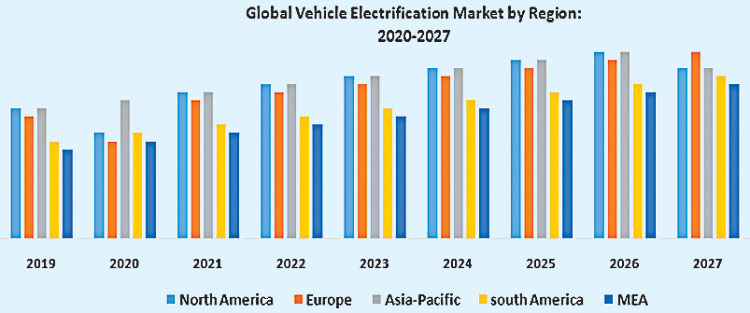Seattle, Apr 5 (FN Agency) Vehicle Electrification covers electric vehicles with purely electrical means of propulsion, like an electric bike. Electrifying an automobile to run on electricity could mean installing high voltage cables in the vehicle’s body or its engine, or it could simply mean installing a device to generate electricity within the engine itself, like an alternator. There are two main categories of vehicle electrification: full-electric vehicles, and hybrid vehicles, which combine the advantages of electric motors with conventional internal combustion engine power. Hybrid vehicles use both electricity and gasoline for their fuel, but the internal combustion engine is not engaged at all times, saving fuel and saving emissions. These vehicles are sometimes also called “pure electric vehicles”, as they run entirely on electricity. The full-electric vehicle is only capable of driving itself in pure a manner, which limits its performance capabilities.

The growing need for reducing vehicle weight and increased fuel efficiency is a prime factor driving the growth of the vehicle electrification market. The increasing focus of manufacturers to improve passenger safety and comfort and also reduce emissions is again fostering the growth of the market. Also, full hybrid vehicles are gaining demand because they offer better fuel economy as compared to mild hybrids. This is further propelling the growth of the market. Governments across developing economies are implementing new policies such as tax exemptions in order to encourage consumers to purchase electric and hybrid vehicles. This factor is projected to provide enormous growth to the market in the near future.
Key players are heavily investing in the R &D to manufacture hybrid vehicles that do not cause any emissions and have higher efficiency are estimated to offer bright opportunities for the vehicle electrification market. For instance, in October 2019, Mahindra and Mahindra have earmarked an investment of Rs. 500 crore for the new electric vehicle technology and R&D center Growing awareness regarding the vehicular emission that causes various environmental issues is expected to raise the sale of an electric vehicle. This is projected to offer profitable market opportunities in the near future. This is shifting focus towards the development of greener technologies in the mobility sectors and manufacturers are putting lots of effort to meet the growing demand for electric vehicles.
Increasing application of engine shut down systems is one of the emerging trends in the vehicle electrification market. During heavy traffic when the vehicle comes to halt, the attached starter generator tool automatically shut off the engine. Moreover, the growing launch of cost-efficient electric vehicles by key manufacturers and improving road infrastructures across developing countries is further projected to uplift the growth of the vehicle electrification market. Increasing sale of passenger cars due to the growing disposable income of the consumers can be one of the trends in the market.
Moreover, a rising number of partnerships among key players in the market for business expansion is also expected to support the growth of the vehicle electrification market. For instance, in March 2021, Mahindra and Israel-based REE Automotive have partnered for electric commercial vehicle (eCV) development. Both companies have signed a memorandum of understanding (MOU) to explore the development and manufacturing of eCVs for global markets. The partnership will help Mahindra make use of REE’s revolutionary electric vehicle corner module and platform technology.

